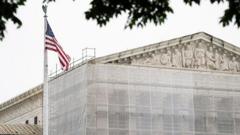Will the Supreme Court Decide the Fate of Trump's Tariffs?

Published: 2025-09-04 02:40:07 | Category: technology
In a significant legal battle, former President Donald Trump is urging the US Supreme Court to overturn a recent appellate court ruling that deemed many of his tariffs illegal. This case, which centres on the extent of presidential power in imposing import taxes, could have profound implications for US economic and foreign policy.
Last updated: 14 October 2023 (BST)
Key Takeaways
- Trump's tariffs, justified under the International Emergency Economic Powers Act, were ruled illegal by the US Court of Appeals for the Federal Circuit.
- The Supreme Court's decision on reviewing the appeal could have major implications for trade policy and economic recovery.
- The appellate court's ruling, which was divided 7-4, emphasises that tariff-setting is primarily a Congressional power.
- The case may lead to refunds of billions in tariffs if the Supreme Court upholds the lower court's decision.
- Legal uncertainty persists as the appellate court's ruling is temporarily stayed pending the Supreme Court's decision.
Background of the Tariffs
In April 2020, Trump signed executive orders imposing a baseline 10% tariff on imports from over 90 countries, intending to address trade imbalances that he claimed threatened US national security. The tariffs were enacted under the International Emergency Economic Powers Act (IEEPA), which allows the president to take action against foreign threats deemed "unusual and extraordinary."
Legal Challenges to the Tariffs
Since their implementation, Trump's tariffs have faced numerous legal challenges. The Court of International Trade in May 2023 ruled that the tariffs were unlawful, a decision that was also put on hold as the appeal process unfolded. Lawsuits were initiated by small businesses and a coalition of states opposing the tariffs, arguing they were detrimental to economic growth and unfairly burdened consumers.
US Court of Appeals Ruling
On 12 October 2023, the US Court of Appeals for the Federal Circuit issued a 7-4 ruling against Trump's tariffs, stating that the authority to impose such tariffs is fundamentally a Congressional responsibility. This decision has far-reaching implications, as it not only undermines Trump's trade agenda but also raises questions about the extent of executive power in economic matters.
Implications of the Supreme Court's Involvement
In response to the appellate court's ruling, Solicitor General John Sauer filed a petition with the Supreme Court, seeking an expedited review. He argued that the ruling has already disrupted critical trade negotiations and created legal ambiguity regarding the president's authority to safeguard national interests. If the Supreme Court declines to hear the case, the appellate court's decision will take effect on 14 October, potentially leading to significant refunds for businesses that paid the tariffs.
Impact on Trade Relations
The outcome of this case is poised to influence not just US economic policy but also its international relationships. Tariffs imposed on countries like Canada, Mexico, and China, particularly those aimed at combatting drug imports, are central to ongoing diplomatic discussions. Should the Supreme Court uphold the lower court's ruling, it may also lead to a reassessment of trade policies that have characterised Trump's presidency.
Current Status and Next Steps
As of now, the Supreme Court's decision on whether to review the appeal remains uncertain. The legal teams are preparing for possible scenarios, and the implications of the court's final ruling could reshape the landscape of US trade policy. Businesses and foreign governments are closely monitoring the situation, as the stakes are high. The legal and economic uncertainty surrounding these tariffs continues to grow, leaving many stakeholders anxious about the future.
Potential Economic Consequences
If the Supreme Court decides against Trump, the ruling could force the US government to refund billions in tariffs collected since their imposition. This could have ramifications not only for the federal budget but also for domestic businesses that relied on the tariffs as a protective measure against foreign competition. Conversely, if the Supreme Court sides with the Trump administration, it might reinforce the president's authority to impose tariffs, potentially leading to further tensions in international trade relations.
Conclusion
The legal battle over Trump's tariffs highlights the contentious nature of trade policy in the US and the complex interplay between executive power and Congressional authority. As the Supreme Court prepares to deliberate on this issue, the outcome will likely resonate beyond the immediate context of tariffs, influencing future administrations and their approach to economic governance.
FAQs
What are the International Emergency Economic Powers Act (IEEPA) tariffs?
The IEEPA allows the president to impose tariffs in response to unusual and extraordinary threats to national security. Trump invoked this act to impose tariffs on various imports, claiming they were necessary to protect US manufacturing.
What did the US Court of Appeals decide regarding Trump's tariffs?
The US Court of Appeals ruled 7-4 that Trump's tariffs were illegal, stating that setting tariffs is a core power of Congress, not the president. This ruling has significant implications for the president's authority in trade matters.
What could happen if the Supreme Court denies the appeal?
If the Supreme Court denies the appeal, the appellate court's ruling will take effect, potentially leading to the refund of billions in tariffs and a significant shift in US trade policy.
How have small businesses reacted to the tariffs?
Many small businesses have opposed the tariffs, arguing that they increase costs and disrupt their ability to compete in the market. Lawsuits filed by these businesses have contributed to the legal challenges against the tariffs.
What are the broader implications of this case?
The case could redefine the balance of power between the executive and legislative branches regarding trade policy, affecting future administrations and their ability to respond to economic challenges.



